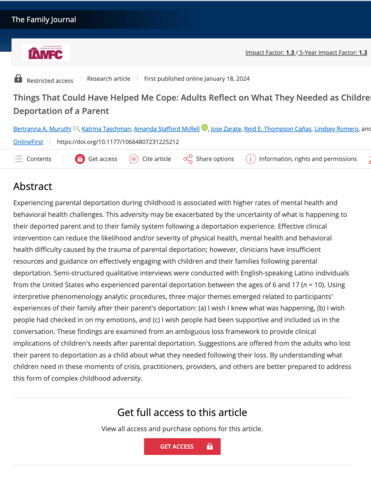This report presents findings from qualitative interviews conducted with English-speaking Latino individuals from the United States who experienced parental deportation between the ages of 6 and 17 years old. They offer suggestions about what they needed following their loss as a child. By understanding what children need in these moments of crisis, practitioners, providers, and others are better prepared to address this form of complex childhood adversity.
Abstract
Experiencing parental deportation during childhood is associated with higher rates of mental health and behavioral health challenges. This adversity may be exacerbated by the uncertainty of what is happening to their deported parent and to their family system following a deportation experience.
Effective clinical intervention can reduce the likelihood and/or severity of physical health, mental health and behavioral health difficulty caused by the trauma of parental deportation; however, clinicians have insufficient resources and guidance on effectively engaging with children and their families following parental deportation. Semi-structured qualitative interviews were conducted with English-speaking Latino individuals from the United States who experienced parental deportation between the ages of 6 and 17 (n = 10).
Using interpretive phenomenology analytic procedures, three major themes emerged related to participants’ experiences of their family after their parent’s deportation: (a) I wish I knew what was happening, (b) I wish people had checked in on my emotions, and (c) I wish people had been supportive and included us in the conversation.
These findings are examined from an ambiguous loss framework to provide clinical implications of children’s needs after parental deportation. Suggestions are offered from the adults who lost their parent to deportation as a child about what they needed following their loss.
By understanding what children need in these moments of crisis, practitioners, providers, and others are better prepared to address this form of complex childhood adversity.

